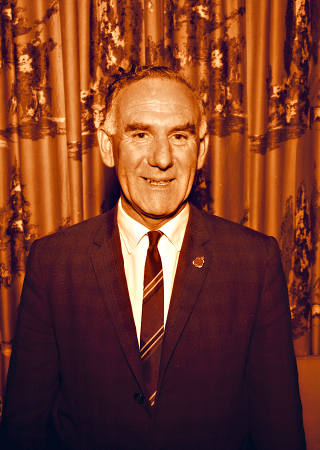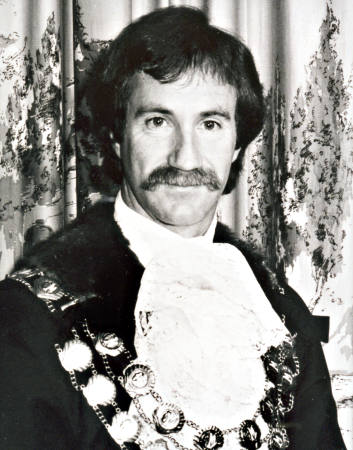Clash of Views between State and Local Governments
In 1964 a clash of views between a State Government authority and a local council brought notoriety and press coverage in Melbourne’s daily newspapers. The two groups concerned were the Health Commission and the City of Mordialloc. Sandwiched between these two groups was a newly appointed health inspector who, no doubt, wondered what he had got himself into by accepting the position. The focus of the conflict was whether there was a need to employ a second health inspector in the municipality to assist with the conduct of immunisation programs and the inspection of food premises.
In July 1964 the Secretary of the Health Commission wrote to the Mordialloc Town Clerk pointing out that the population of the municipality was approaching 27,000 residents, and given that number, under the Health Act 1958, a second inspector was necessary. The Commission’s view was that for each group of 13,000 residents a full time inspector was required. [1]
Following the receipt of the letter from the Secretary of the Health Commission, Fredrick Gorman, the sole health inspector employed by the Mordialloc Council, reported a month later to the Finance, Administration and Staff Committee. He wrote that while record-keeping for immunisation programs and food premises inspections was time demanding, the appointment of clerical assistance would relieve the situation. Given this adjustment he believed there would be insufficient work for two full time inspectors as he would have more time for inspections and investigations.
Commission officers, accompanied by F Gorman, inspected nineteen premises including greengrocers, cake shops, butchers, fish and chip shops, milk bars and delicatessens in late 1971. The officers found that not all premises were being maintained at a level commensurate with regulations under the Health Act and were not being subject to regular inspections. Gorman wrote to the Town Clerk in January 1972 noting that while he accompanied the officers from the Health Department he was not privy to their notes nor involved in discussions of their conclusions. He went on to suggest that the report was ‘coloured’ to support the contention that a second inspector was necessary. While acknowledging congested and untidy store rooms, soft drinks not under cover and over-loaded freezers were undesirable; in his view their existence did not contravene any regulations. In February 1972 the Council informed the Commission that it proposed to take no action regarding the appointment of a second inspector at that stage. [2]
In a submission for financial assistance under the Grants Commission Act 1973 the council noted that the need for an additional inspector had been considered on many occasions in the past but the lack of finance had prevented action. Moreover, they acknowledged that demands on the inspector had increased, particularly in the fields of noise, air and liquid pollution. [3]

Ron Morris, Health Inspector, City of Mordialloc, c1970. Courtesy Kingston Collection.
Gorman retired in 1973 and Ronald G Morris was appointed to the position in March 1974. It was three months later he was reporting to the Town Clerk that a second inspector was urgently needed and, to justify this conclusion, pointed to situations that required frequent inspections to ensure regulatory compliance. They included the compliance of private schools with fire prevention regulations, school canteens with food premises regulations, places of amusement with public building regulations, stables with council by-laws and the Health act, and licensed victuallers premises with cleanliness regulations, boarding and lodging house regulations and food premises regulations.
A second report from the health inspector was submitted to Council in February 1975. Morris pointed to the minimum number of registered premises that required inspections was 759 but in fact only 571 inspections were conducted. Of 435 contraventions related to sanitation and construction only 46 notices were served on proprietors. He drew attention to the total number of inoculations given in 1974 and although he expected the number would decrease in 1975 believed the amount of time required to organise and conduct the various campaigns remained unchanged. While the municipality had a serious rodent problem, time was not available to implement adequate treatment or control. [4]
The Council had appointed a cadet inspector but in March 1975 he resigned after six months employment. The reasons for his resignation were unclear. A report by Town Planning, General Purposes and Policy committee was considered by Council and it was agreed to call for applications for an additional Health Inspector. [5] Not all councillors agreed with this action although Cr Geoffrey Russell placed the issue in a wider context. He saw the Health Act 1958 as a charade as it did not, in his view, tackle the real health hazards of the day. He objected to the appointment of a second health inspector who would be wasting time trying to enforce the regulations of a ‘nineteenth century Health Act’. [6] Russell pointed to behaviour contravening regulations by individuals delivering bread when not wearing overalls and thereby exposing unwrapped bread to contamination. Yet this, he said, did not address the fact that up to twenty five chemicals can be added to the staff of life. These chemicals should be banned unless they are proved to be harmless to the body. The appointment of a second health inspector, in his view, would not have any impact on the situation. [7]
A deputation from the State Department of Health once again met with the Council in April 1976 urging them to appoint a second inspector. [8] Cr Mal Buxton, while acknowledging that the survey of 1971 found some minor defects, he suggested nothing of a major nature was discovered. He went on to suggest that the Health Inspector might be spending too much time on trivial matters. Following this deputation the Administration Committee at its meeting on 22 April 1976 recommended to Council that ‘the Health department be advised that as the recent deputation from Officers of the Department did not establish the need for a second Health Inspector within this City, the matter of an appointment of a Second Health Inspector or Cadet Health Inspector has been deferred until such time as the Department produces statistics and other detailed information to satisfy Council that an appointment is warranted, having regard to the particular nature and needs of this Municipality.’

Councillor Mal W Buxton, 1963. Courtesy Leader Collection.
Responding to this reply the Health Department instituted a survey of food premises, to be conducted for at least a month, by a State Health Department Inspector accompanied by the Council’s Health Inspector. [9] Twenty two premises were visited and a report prepared detailing twenty one with faults that required rectification. It was claimed that the premises where the inspectors found faults were below standard.
The Secretary of the Commission of Public Health wrote to the Mordialloc Town Clerk in July 1976 stating ‘In view of the results of the survey and the reluctance of the Council to take action to appoint a second Heath Inspector, the Commission directed me to advise that it determined in accordance with section 31 of the Health act to require the Council of the City of Mordialloc to appoint a second Health Inspector and also directed that the Council be required to advise the Commission within 30 days of the action taken to comply with such direction.’
Then came an explosion of daily and local newspaper reports with a variety of headings;
- Health Man ‘Sought Aide’,
- Public Health Row, Shops Filthy:
- Health Report, Health Blitz ‘intimidation’,
- Main Street in Two-way Tug, and
- Mordialloc to Stand Firm over Health.
Don Tatnell, the acting City Manager, said the Council resisted the move by the Commission for a second inspector because ‘we never had any real proof that we needed one.’ [10] The new mayor, Cr Michael Buxton, was reported in the Age of accusing the Commission of ‘trying to carry out a propaganda exercise intended to force the council to employ a second health inspector. It may be that a second health inspector is warranted, but up to now the commission hasn’t been very convincing in its efforts to persuade council that one is needed,’ he said.
Cr Buxton was critical of the size of the sample of shops visited by the survey team, given that there were several hundred health premises in Mordialloc. Moreover, he said, the task force tended to take an intimidatory approach to businesses, picking up the most minor and uncontroversial matters and alleged breaches of the Health Act. [11] The Sun quoted mice droppings in ovens; fat, dirt, and dead insects in the bowls of a frying unit; thick accumulation of dirt, fluff and mice droppings in a refrigerator; four mouse bodies in the motor compartment of a refrigerator and blood stained ice in the freezer; and a filthy meat slicer caked with stale food, blood and grease. [12]
The Council discussed the Commission’s report on 16 July 1976 and concluded that the information provided did not substantiate the claim that a second Health Inspector was required. This conclusion was communicated to the Commission together with notification that Council objected to the manner in which the Commission had proceeded with their inquiry. The grounds for this complaint were three in number. First, the Council objected to an investigation of this nature being undertaken without prior notice in writing being delivered to the Council. Secondly, it criticised the Commission’s concentration on minor alleged breaches, many of which were unrelated to the health of the community and apparent harassment of many owners. Thirdly, Council denounced the Commission’s carefully prepared publicity campaign based upon a quantitative statement of alleged breaches which in no way justified or supported the alarmist and extremist claims of the Commission … which led the Council to believe that the Commission carried out an unsupported and unwarranted campaign against Council with the sole intention of proving a biased and previously held point of view on the alleged need for two Health Inspectors. [13]
A second motion was put at that Council meeting by Cr Michael Buxton and seconded by Cr Tindal. It directed that the Minister of Health be advised to investigate the procedure followed by the Commission and urgently review the Health Act, a document that the Council believed was inappropriate for the health needs of the community as it ’concentrates excessively on a large number of relatively minor matters but ignored many major health issues, so necessitating the expenditure by municipalities of inordinate amounts of capital on salaries often in the over zealous concentration of false health issues.’ [14]
There were several letters to the local press from residents of the municipality responding to earlier newspaper reports. One from a former councillor, writing under the ’non du plume of Pr Bono’ reminded readers of an earlier occasion when the Mordialloc Council refused to act causing the Commission to seize government funds to pay for an inspector, as under the Act it was the responsibility of the Commission to ensure councils carried out their responsibilities. To say that an additional inspector is not now required because on was not wanted years ago only shows ignorance of the progress made in the municipality and health services,’ he wrote. ’Very Interest Ratepayer’ praised the diligence of the Health Commission for persisting with the issue for at least eight years and wondered about the candour and honesty of the Council spokesmen involved in the controversy. He or she believed the whole story had not been told.
The Secretary of the Commission of Public Health, responding to the Council’s rejection of the Commission’s ultimatum, pointed out that the Council had provided no evidence that would cause the Commission to change its directive. However, it would wait until the 30 days notice given to the Council had expired before taking further action. The secretary also addressed other concerns of Council detailed in correspondence. First, he wrote that the situations reported in the survey of twenty two businesses could hardly be said to be minor alleged breaches as the existence of dirty food premises is most relevant to the health of the community. Secondly, the Departmental officer concerned in the survey categorically denied any harassment of owners of businesses in the conduct of the survey. Thirdly, the report was presented to the Commission in an open meeting and, in accordance with long standing practice, members of the press were present. There was no ‘carefully prepared publicity campaign’ as alleged. Moreover, the manner of press reporting is not a matter within the Commission’s control. [15]
The Minister of Health, W V Houghton, also responded to the Council’s letter of advice and comment. He said he had examined the survey report about the condition of various premises and thought that the rate-payers of City of Mordialloc would be as concerned about them as he was. As far as the Health Act was concerned it was under review. However, he warned the changes that were being proposed were mainly matters of organization and administration rather than the matters the Council had raised. He invited the Council to enlarge upon the major health issues alluded to in their letter and also to expand on the ‘over zealous concentration on false health issues’ statement. [16]
Cr Michael Buxton, seconded by Cr Pearson, moved at the 9 August 1976 Council meeting that a second Health Inspector be employed and the Commission of Public Health be advised that an advertisement would be placed. [17] This motion was presented on the basis of a committee recommendation which stated that ‘not withstanding the unsatisfactory surrounding circumstances and without agreeing with the allegations of the Commission of Public Health concerning shopkeepers that the Commission be advised that Council will appoint an additional Health Inspector to be the Senior Health Inspector of the Municipality. Furthermore the position be advertised at a salary of $13,242 per annum and preferably on an age range of forty to fifty years.’ [18]

Cr Michael Buxton, Mayor of City of Mordialloc 1975/76. Courtesy Kingston Collection.
The Council was grudgingly conceding defeat at the hands of the Health Commission but was not prepared to admit any errors in their original argument. Clearly they were not happy with the actions of their thirty-year-old Health Inspector who was involved in the damaging surveys conducted of premises in the City of Mordialloc and made this plain in specifying an age range excluding the possibility, at that time, of his appointment to a more senior position in the municipality. Two members of the Council’s administrative committee proposed that the conditions under which the Health Inspector’s staff worked should change and the inspector’s secretary should be reassigned to the staff of the Town Clerk’s Department. [19] This was not agreed to by the majority of members of the committee so a softer proposal was made and accepted. The recommendation to Council was that the issue of the health inspector’s staffing be deferred until the new Council Year.
Ron Morris, no doubt, did not anticipate the cauldron of fire in which he found himself on his appointment to the City of Mordialloc in 1974 after ten years service with the Melbourne City Council. He spent two and a half years watching the interactions between two powerful groups and resigned in 1979 to take up the role of lecturer in environmental health at Swinburne College of Technology, (later Swinburne University) the start of a long career in tertiary education.
Footnotes
- File: Reports and Information re Need for Additional Health Inspectors, Mordialloc City Council.
- File: op cit.
- Draft – Submission for Financial Assistance Under the grants Commission Act 1973.
- File: ibid.
- Council Minutes 25 March 1975 Item 280/1/32.
- At a subsequent meeting with Council in July 1976 Ex Councillor Russell said, no doubt the appointment of another health inspector to Mordialloc would disclose more infringements to the Health Act but this would not make one iota of difference to the health of residents in this municipality. Council Minutes, Health Act 280/22, 26 July 1976.
- Mordialloc-Chelsea News, 4 June 1975.
- Council Minutes : Second Health Inspector 280/4/25.
- Town Planning and General Committee Meeting, 5 July, 1976.
- Herald, 14 July 1976.
- The Age, 14 July 1976.
- Sun, 14 July 1976.
- Council Minutes, Municipal Survey 280/22, 16 July 1976.
- Council Minutes, op.cit.
- File: Reports and Information re Need for Additional Health Inspectors, Mordialloc City Council.
- Correspondence, Minister of Health.
- Council Minutes: Additional Health Inspector 280/22.
- File: ibid.
- Cr Michael Buxton & Cr Peter Scullin – Council Minutes, 9 August 1976, Item 280/22.
